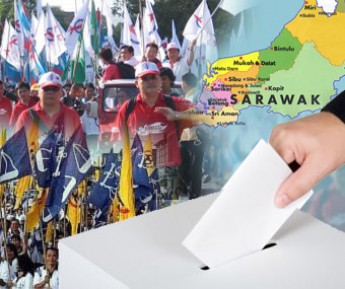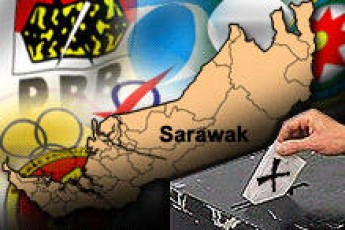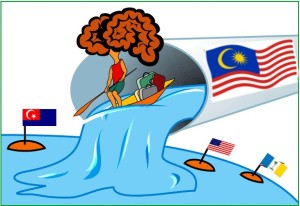Sim Kwang Yang
The state of Sarawak is now gearing towards the 10th state elections.
Sarawakians must go to the polls before July this year.
Any state or national election is a major event in the political life of the people.
Malaysia is a working democracy, and voting into power the government of the day is one of the most important events for common citizens.
In the case of Sarawak, the election is unlikely to see a change of the state government: Barisan Nasional still enjoys overwhelming control over the politics of the state.
The Barisan Nasional’s hold on the instruments of power remains rock solid.
But the opposition has enjoyed a resurgence among the urban, mostly Chinese, voters.
 In the last state election, the opposition Democratic Action Party (DAP) won six seats of the 12 contested, with a single seat going to Parti Keadilan Rakyat (PKR).
In the last state election, the opposition Democratic Action Party (DAP) won six seats of the 12 contested, with a single seat going to Parti Keadilan Rakyat (PKR).
By all accounts, the Chinese voters will vote for the state opposition DAP and PKR again in the coming election.
There is a reason why the opposition can find fertile soil mainly among Chinese voters.
Many of the Chinese people are financially independent, and are not very reliant on the Barisan Nasional for fulfilling their development needs.
Theirs are mostly urban constituencies, and they enjoy better infrastructure development than their rural counterparts.
Communication between the voters is far superior in the towns and cities, where the citizens enjoy better Internet and other information technology facilities than in far-flung villages in the rural areas.
The difficulty in interpersonal communication in the rural areas remains one of the main reasons why the opposition parties have made so little headway in rural constituencies.
The ruling Barisan Nasional also monopolises all means of distributing election goodies to the rural voters, including minor development funds, and money needed for infrastructure, such as the building of roads and bridges.
 The rural voters know very well that the Barisan Nasional is their only godfather.
The rural voters know very well that the Barisan Nasional is their only godfather.
In the rural constituencies, the ruling Barisan Nasional also dominates all avenues of mobilising political support groups, the transportation of voters, and the funds for maintaining a large army of party foot soldiers.
This overwhelming advantage has ensured the Barisan Nasional their grip on political power in the state of Sarawak.
The political horizon of the rural voters is also limited and somewhat myopic.
The political concerns of the rural voters, especially in the remote villages, seldom expand beyond their immediate geographical location, such as the next river or the next hill.
The imagination of rural Sarawakian voters is, unsurprisingly, narrow, and national political issues are seldom of immediate concern to these voters.
In recent years, a large number of young, eligible voters have moved out of their rural heartland to work in cities in Peninsular Malaysia such as Johor Baharu, Kuala Lumpur and Melaka.
This massive migration has stripped the rural constituencies of many eligible voters; I have been to many rural communities where young voters are hard to find, for they have all drifted to the urban centres.
Most of these rural young are working in low-paying jobs in towns and cities, and many of them will not be able to afford to return to their home constituencies to vote in the coming election.
The opposition parties are therefore isolated from their natural support base in the rural constituencies – young rural voters more exposed to political information and debates — who might otherwise become agents of social change for the entire state of Sarawak.
By all accounts, the Barisan Nasional government looks set to be returned to power, although the opposition parties may enjoy pockets of support in the urban constituencies.
I am glad that we will not witness the kind of change of government that has happened in Egypt.
Sarawak is a peaceful state, and any political shift in power should occur through the electoral process.
The revolution in Egypt may have been necessary in that faraway land because of the deep-rooted problems of poverty and repression there — worse than our own socioeconomic problems.
In all fairness, Sarawak is still a state that is governed by the rule of law, and people seeking change can still participate in the democratic process.
Malaysia is, by and large, a working democracy, so I would like to say to all you Sarawak voters: go out to vote, and may the best candidate win!


No comments:
Post a Comment
Note: Only a member of this blog may post a comment.